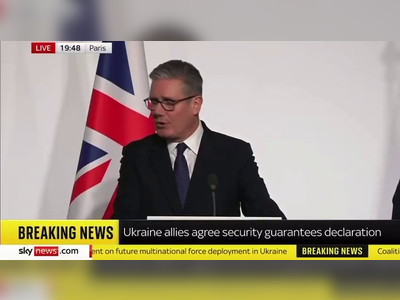Risk of Sliding into World War III Becomes Tangible
The brutal conflict between Israel and Hamas has been fueling violence and instability in the Middle East. Fortunately, East Asia is not at war, though definitely not at peace either as China compels its neighbors and accumulates military power at a historical pace. Many Americans might be unaware of how close the world is to being devastated by intense and overlapping conflicts, perhaps due to forgetting how the last global war emerged, writes Hal Brands, Professor at Johns Hopkins University and Senior Fellow at the American Enterprise Institute, in his analysis published in the pages of Foreign Affairs.
When Americans think of a global war, it is often World War II that comes to mind specifically the part that began with Japan's attack on Pearl Harbor in December 1941. Following this attack and Adolf Hitler's subsequent declaration of war against the United States the conflict became a single, all-encompassing battle between rival alliances on a global battlefield. However, World War II actually started with loosely connected struggles for dominance in key regions from Europe to the Asia-Pacific, struggles that eventually peaked globally and intertwined. The history of that period reveals the darker aspects of strategic interdependence in a war-plagued world. There are disconcerting parallels to the current situation facing Washington.
The United States is not facing a formal alliance of adversaries as it did during World War II. A scenario where autocratic powers conquer massive territories in Eurasia and its coastal regions is unlikely to recur. Still, as wars already rage in Eastern Europe and the Middle East, and relationships among revisionist states increasingly come to the fore, it would only take one clash in the disputed Western Pacific to bring about a dreadful scenario where intense, interconnected regional struggles sweep through the international system, triggering a global security crisis unseen since 1945. A world under threat could become a world at war, and the United States is far from ready for such a challenge, the author asserts.
WAR AND MEMORY
American memories of World War II are indelibly shaped by two unique aspects of America's experience. First, the United States entered the conflict very late more than two years after Hitler shook Europe by invading Poland, and over four years after Japan began the war in the Pacific by invading China. Second, the United States engaged simultaneously on both battlefronts.
Therefore, the war became global the moment the United States stepped in; from December 1941, the conflict pitted a coalition across multiple continents, the Allied Powers, against another such coalition, the Axis Powers. (The Soviet Union was an exception, staying at peace with Japan from 1941 to 1945). This truly was a world war in the fullest sense. Yet, the deadliest conflict in history didn't start that way.
Instead, World War II was the cumulative result of three regional crises: Japan's rampage in China and across the Asia-Pacific, Italy's imperial ambitions in Africa and the Mediterranean, and Germany's quest for hegemony in Europe and beyond. These crises were always interconnected to some degree. Each was perpetrated by an authoritarian regime that widely used coercion and violence. Each aimed for dominance over a globally significant region. Each contributed to what President Franklin Roosevelt in 1937 called the "epidemic of world lawlessness." Still, it was far from an integrated mega-conflict from the start.
THE PAST AMONG US
The parallels between that earlier era and today are striking. As in the 1930s, the international order currently faces three sharp regional challenges. China is rapidly increasing its military power to displace the United States from the Western Pacific and perhaps to become the leading world power. Russia's war in Ukraine is the deadly center of a longstanding effort to regain primacy in Eastern Europe and the former Soviet region. In the Middle East, Iran and its proxies which include Hamas, Hezbollah, the Houthis, and many others are waging a bloody fight for regional dominance against Israel, the Gulf monarchies, and the United States. The fundamental common thread connecting the revisionist states is once again autocratic governance and geopolitical grievance; in this case, the desire to break the U.S.-led order that deprives them of coveted greatness. Beijing, Moscow, and Tehran represent the new powers challenging the current ones: Washington and its allies.
Like in the 1930s, revisionist powers don't always see eye to eye. Russia and China both aspire to priority in Central Asia. In addition, they are making inroads in the Middle East in such a way that sometimes threaten Iran's interests there. Should the revisionists ultimately oust their common enemy, the United States, from Eurasia, eventually they may fight among themselves for the spoils just as the Axis Powers would have likely turned on each other if they had somehow managed to defeat their rivals. For now, though, relationships among the revisionist powers are flourishing, and Eurasia's regional conflicts are becoming increasingly intertwined.
One crucial difference between the 1930s and today is the degree of revisionism. No matter how egregious Putin and Iranian Supreme Leader Ali Khamenei may be, they haven't annexed large chunks of key regions. Another critical difference is the precarious peace still present in East Asia. But with U.S. officials warning that China could become more aggressive as its capabilities mature perhaps as early as the second half of this decade it's worth pondering what would happen if this region turned into a tinderbox.
Linked with conflicts elsewhere, an East Asian war could produce a situation not seen since the 1940s, when large-scale violence erupted simultaneously across all three key regions of Eurasia. This might not necessarily lead to a single, encompassing world war. But a world engulfed by war would be the outcome, as the United States and other defenders of the existing order would have to face multiple, overlapping conflicts affecting some of the Earth's most important strategic territories.
GATHERING STORM CLOUDS
There are many reasons why this scenario may not materialize. East Asia could remain peaceful, for the United States and China have significant incentives to avoid a calamitous war. The conflicts in Ukraine and the Middle East could calm down. However, contemplating the nightmare scenario is still worthwhile because the world is only a single mismanaged crisis away from a spread of Eurasian conflict and because the United States is so unprepared for this contingency.
Currently, the United States is striving to support both Israel and Ukraine. The requirements of these two wars in which Washington is not yet the main combatant are stretching the United States' capabilities in areas such as artillery and missile defense. The presence in waters around the Middle East, tasked with deterring Iran and keeping critical maritime routes open, strains the U.S. Navy's resources. Strikes against Houthi targets in Yemen consume tools like Tomahawk missiles, which would become much more valuable in a U.S.-China conflict. These are all symptoms of a greater problem: the diminishing capabilities and capacities of the American military in the face of numerous, interconnected challenges.
Of course, the United States was not ready for global war in 1941 either, but eventually triumphed through a colossal mobilization of military and industrial might. President Joe Biden evoked this legacy late last year when stating that the United States must again become the "arsenal of democracy." His administration has invested in expanding the production of artillery ammunition, long-range missiles, and other critical weapons. However, the stark reality is that the defense industrial base that prevailed in World War II and the Cold War no longer exists, thanks to persistently underfunded investments and a broader decline in American manufacturing. Shortages and bottlenecks are everywhere; the Pentagon recently acknowledged "material shortages" that complicate "rapid scaling" of production in a crisis. Many allies have even weaker defense industries.
Thus, it would be a significant challenge for the United States to mobilize for multi-regional war or even sustained conflict in one area while assuring allies' supply in others.
Producing the vast stockpiles of ammunition necessary for a great-power conflict or replacing ships, planes, and submarines lost in battle would be difficult. In a potential Pacific war, it would certainly strain to keep pace with its most formidable rival; as one Pentagon report phrases it, China today is "the world's powerhouse in several sectors from shipbuilding to critical minerals to microelectronics" which could confer a decisive mobilization advantage in a struggle with the United States. Should war envelop multiple theaters in Eurasia, it's not assured that Washington and its allies would prevail, the author writes.
It doesn't help to pretend that these issues have an obvious or imminent solution. If we were to focus the bulk of U.S. military power and strategic attention on Asia as some analysts urge, it would under any circumstances strain America's global leadership role. At a time when the Middle East and Europe are already in profound turmoil, it would be tantamount to superpower suicide. While a dramatic increase in military spending to mitigate global risks is strategically essential, politically it seems infeasible, at least until the United States experiences a more jolting geopolitical shock. Moreover, it would take time for a significant boost in defense outlays to translate into tangible military benefits for Washington and its friends. The Biden administration's approach, it seems, is to marginally and selectively increase military spending in Ukraine and the Middle East and bet that China won't become even more belligerent a policy that could work rather well or fail catastrophically.
The international stage has darkened dramatically in recent years. The Biden administration imagined a "stable and predictable" relationship with Russia in 2021 until the country attacked Ukraine in 2022. In 2023, U.S. officials believed the Middle East to be calmer than at any time this century right before a devastating, regionally destabilizing conflict erupted. U.S.-Chinese tensions currently aren't particularly feverish, but sharpening rivalry and changing military balances create a dangerous mix. Large catastrophes often seem implausible until they occur. As the strategic environment deteriorates, it is time to recognize just how conceivable a global conflict has become, the author concludes.
The United States is not facing a formal alliance of adversaries as it did during World War II. A scenario where autocratic powers conquer massive territories in Eurasia and its coastal regions is unlikely to recur. Still, as wars already rage in Eastern Europe and the Middle East, and relationships among revisionist states increasingly come to the fore, it would only take one clash in the disputed Western Pacific to bring about a dreadful scenario where intense, interconnected regional struggles sweep through the international system, triggering a global security crisis unseen since 1945. A world under threat could become a world at war, and the United States is far from ready for such a challenge, the author asserts.
WAR AND MEMORY
American memories of World War II are indelibly shaped by two unique aspects of America's experience. First, the United States entered the conflict very late more than two years after Hitler shook Europe by invading Poland, and over four years after Japan began the war in the Pacific by invading China. Second, the United States engaged simultaneously on both battlefronts.
Therefore, the war became global the moment the United States stepped in; from December 1941, the conflict pitted a coalition across multiple continents, the Allied Powers, against another such coalition, the Axis Powers. (The Soviet Union was an exception, staying at peace with Japan from 1941 to 1945). This truly was a world war in the fullest sense. Yet, the deadliest conflict in history didn't start that way.
Instead, World War II was the cumulative result of three regional crises: Japan's rampage in China and across the Asia-Pacific, Italy's imperial ambitions in Africa and the Mediterranean, and Germany's quest for hegemony in Europe and beyond. These crises were always interconnected to some degree. Each was perpetrated by an authoritarian regime that widely used coercion and violence. Each aimed for dominance over a globally significant region. Each contributed to what President Franklin Roosevelt in 1937 called the "epidemic of world lawlessness." Still, it was far from an integrated mega-conflict from the start.
THE PAST AMONG US
The parallels between that earlier era and today are striking. As in the 1930s, the international order currently faces three sharp regional challenges. China is rapidly increasing its military power to displace the United States from the Western Pacific and perhaps to become the leading world power. Russia's war in Ukraine is the deadly center of a longstanding effort to regain primacy in Eastern Europe and the former Soviet region. In the Middle East, Iran and its proxies which include Hamas, Hezbollah, the Houthis, and many others are waging a bloody fight for regional dominance against Israel, the Gulf monarchies, and the United States. The fundamental common thread connecting the revisionist states is once again autocratic governance and geopolitical grievance; in this case, the desire to break the U.S.-led order that deprives them of coveted greatness. Beijing, Moscow, and Tehran represent the new powers challenging the current ones: Washington and its allies.
Like in the 1930s, revisionist powers don't always see eye to eye. Russia and China both aspire to priority in Central Asia. In addition, they are making inroads in the Middle East in such a way that sometimes threaten Iran's interests there. Should the revisionists ultimately oust their common enemy, the United States, from Eurasia, eventually they may fight among themselves for the spoils just as the Axis Powers would have likely turned on each other if they had somehow managed to defeat their rivals. For now, though, relationships among the revisionist powers are flourishing, and Eurasia's regional conflicts are becoming increasingly intertwined.
One crucial difference between the 1930s and today is the degree of revisionism. No matter how egregious Putin and Iranian Supreme Leader Ali Khamenei may be, they haven't annexed large chunks of key regions. Another critical difference is the precarious peace still present in East Asia. But with U.S. officials warning that China could become more aggressive as its capabilities mature perhaps as early as the second half of this decade it's worth pondering what would happen if this region turned into a tinderbox.
Linked with conflicts elsewhere, an East Asian war could produce a situation not seen since the 1940s, when large-scale violence erupted simultaneously across all three key regions of Eurasia. This might not necessarily lead to a single, encompassing world war. But a world engulfed by war would be the outcome, as the United States and other defenders of the existing order would have to face multiple, overlapping conflicts affecting some of the Earth's most important strategic territories.
GATHERING STORM CLOUDS
There are many reasons why this scenario may not materialize. East Asia could remain peaceful, for the United States and China have significant incentives to avoid a calamitous war. The conflicts in Ukraine and the Middle East could calm down. However, contemplating the nightmare scenario is still worthwhile because the world is only a single mismanaged crisis away from a spread of Eurasian conflict and because the United States is so unprepared for this contingency.
Currently, the United States is striving to support both Israel and Ukraine. The requirements of these two wars in which Washington is not yet the main combatant are stretching the United States' capabilities in areas such as artillery and missile defense. The presence in waters around the Middle East, tasked with deterring Iran and keeping critical maritime routes open, strains the U.S. Navy's resources. Strikes against Houthi targets in Yemen consume tools like Tomahawk missiles, which would become much more valuable in a U.S.-China conflict. These are all symptoms of a greater problem: the diminishing capabilities and capacities of the American military in the face of numerous, interconnected challenges.
Of course, the United States was not ready for global war in 1941 either, but eventually triumphed through a colossal mobilization of military and industrial might. President Joe Biden evoked this legacy late last year when stating that the United States must again become the "arsenal of democracy." His administration has invested in expanding the production of artillery ammunition, long-range missiles, and other critical weapons. However, the stark reality is that the defense industrial base that prevailed in World War II and the Cold War no longer exists, thanks to persistently underfunded investments and a broader decline in American manufacturing. Shortages and bottlenecks are everywhere; the Pentagon recently acknowledged "material shortages" that complicate "rapid scaling" of production in a crisis. Many allies have even weaker defense industries.
Thus, it would be a significant challenge for the United States to mobilize for multi-regional war or even sustained conflict in one area while assuring allies' supply in others.
Producing the vast stockpiles of ammunition necessary for a great-power conflict or replacing ships, planes, and submarines lost in battle would be difficult. In a potential Pacific war, it would certainly strain to keep pace with its most formidable rival; as one Pentagon report phrases it, China today is "the world's powerhouse in several sectors from shipbuilding to critical minerals to microelectronics" which could confer a decisive mobilization advantage in a struggle with the United States. Should war envelop multiple theaters in Eurasia, it's not assured that Washington and its allies would prevail, the author writes.
It doesn't help to pretend that these issues have an obvious or imminent solution. If we were to focus the bulk of U.S. military power and strategic attention on Asia as some analysts urge, it would under any circumstances strain America's global leadership role. At a time when the Middle East and Europe are already in profound turmoil, it would be tantamount to superpower suicide. While a dramatic increase in military spending to mitigate global risks is strategically essential, politically it seems infeasible, at least until the United States experiences a more jolting geopolitical shock. Moreover, it would take time for a significant boost in defense outlays to translate into tangible military benefits for Washington and its friends. The Biden administration's approach, it seems, is to marginally and selectively increase military spending in Ukraine and the Middle East and bet that China won't become even more belligerent a policy that could work rather well or fail catastrophically.
The international stage has darkened dramatically in recent years. The Biden administration imagined a "stable and predictable" relationship with Russia in 2021 until the country attacked Ukraine in 2022. In 2023, U.S. officials believed the Middle East to be calmer than at any time this century right before a devastating, regionally destabilizing conflict erupted. U.S.-Chinese tensions currently aren't particularly feverish, but sharpening rivalry and changing military balances create a dangerous mix. Large catastrophes often seem implausible until they occur. As the strategic environment deteriorates, it is time to recognize just how conceivable a global conflict has become, the author concludes.
AI Disclaimer: An advanced artificial intelligence (AI) system generated the content of this page on its own. This innovative technology conducts extensive research from a variety of reliable sources, performs rigorous fact-checking and verification, cleans up and balances biased or manipulated content, and presents a minimal factual summary that is just enough yet essential for you to function as an informed and educated citizen. Please keep in mind, however, that this system is an evolving technology, and as a result, the article may contain accidental inaccuracies or errors. We urge you to help us improve our site by reporting any inaccuracies you find using the "Contact Us" link at the bottom of this page. Your helpful feedback helps us improve our system and deliver more precise content. When you find an article of interest here, please look for the full and extensive coverage of this topic in traditional news sources, as they are written by professional journalists that we try to support, not replace. We appreciate your understanding and assistance.


















